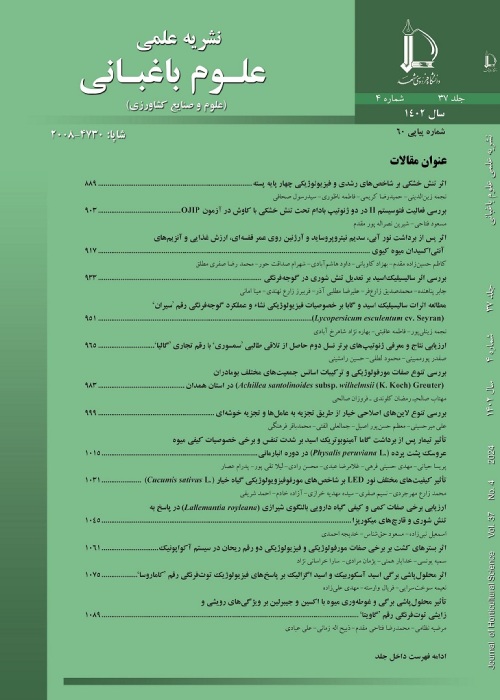Impact of Postharvest Application of Ascorbic Acid on Storage Life and Quality Attributes of Persimmon Fruit (Diospyros kaki Thunb)
F. Nasr , V. Rabiei , F. Razavi * , G. Gohari
Persimmon (Diospyros kaki Thunb.) is an important fruit that is consumed due to high nutritional, desirable taste and flavor. Unfortunately, most persimmon fruit producers do not use the suitable technology to preserve the fruit quality, consequently, marketing their product at lower prices. The fruit of Karaj cultivar is one of the best and highest quality cultivars in Iran but this fruit is sensitive to chilling injury and shows drastic softening and reduced nutritional value as chilling damage. Appliacation of effective treatments for reducing chilling symptoms and preserve quality can lead to the increase of shelf life in this fruit. Ascorbic acid is an important nutrient that it is required for the functioning of several enzymes and is important for immune system function. It also functions as an antioxidant. Recently this treatment has gained much attention for use as an environmentally friendly technology for the maintenance of postharvest quality of many horticultural crops. In this regard, the aim of the present study was to assess the effect of ascorbic acid and storage time on the postharvest life of persimmon fruit.
Persimmon fruit (cv.‘Karaj’) was first harvested at physiological maturity stage from a commercial orchard in Karaj city, then immediately transported to the postharvest laboratory at University of Zanjan. Fruit selected for uniformity of size, shape, color and free from disease or mechanical damage. The treatments included ascorbic acid at three levels (15, 30 and distilled water as a control mmol.L-1) and storage time at three levels (15, 30 and 45 day). Fruit was dipped in solution of Ascorbic acid 15 and 30 mmol.L-1 and distilled water (control) for 10 min. After treatment, the fruits were stored at +4°C and 85-90% relative humidity for 45 days. Fruits were sampled during storage after (15, 30 and 45 days) and 24 hours maintaining at room temperature and fruit firmness, weight loss, TSS, TA, vitamin C, total flavonoids, total phenol, soluble tannins, total carotenoids, antioxidant capacity and MDA were measured at the end of each period. Persimmon fruit samples were weighed before and after the storage to calculate weight loss (%) during storage by using the formula of [(weight of fruits before the storage − weight of fruits after the storage)/weight of fruits before storage] × 100. Fruit firmness was determined using OSK 1618 penetrometer equipped with an 8 mm tip at 3 equatorial points, and the results were expressed as kg/cm2, Soluble tannin was measured by using the method of Tiara (1996). Total carotenoid was measured based on wang et al (2006), Total soluble solid (TSS) was measured by using refractometer, Ascorbic acid content was determined by using the method of Jalilimarandi (2000) and Antioxidant activity was evaluated by measuring the scavenging activity of the examined extracts on the 2,2-diphenylhydrazil (DPPH) radical as described by Dehghan and Khoshkam (2012). Statistical analysis was performed using SAS V9 software and the treatment means were separated by Duncan’s multiple range tests.
Results showed that all treatments showed significant effect on evaluated traits. All treatments preserved vitamin C and antioxidant activity of fruit compared with control. Ascorbic acid 30 mmol.L-1 significantly preserved firmness, soluble tannin, total phenol, flavonoid, antioxidant capacity. Based on current results that ascorbic acid 15 and 30 mmol.L-1 treatments were the most effective in delaying decrease weight loss by reduced metabolic activity, delayed senescence, and maintained better cellular integrity thereby worked in an integrated manner to reduce fresh weight loss of persimmon fruit. Increasing Ascorbic acid suppressed oxidative damage possibly by quenching hydrogen peroxide and superoxide anion. Therefore, positively correlated with higher membrane integrity and less MDA of persimmon fruit. Ascorbic acid is not only an important nutraceutical compound but also a critical antioxidant that positively eliminates certain reactive oxygen species and preserve antioxidant compounds such as phenol, flavonoid, carotenoid and vitamin C in post-harvest. Ascorbic acid 15 and 30 mmol.L-1 treatments used in this experiment had no effect in changes TSS and total carotenoid. So ascorbic acid can improve effectively the quality and increase shelf life of fresh persimmon fruit in post-harvest.
In conclusion, our research indicates that ascorbic acid could prolong postharvest life of persimmon fruit by maintaining fruit quality attributes. Ascorbic acid treatment significantly is effective in preserving, firmness antioxidant compounds, quality properties and increasing the storage time of persimmon fruit of Karaj cultivar without harmful for human health. Hence, ascorbic acid treatment is a safe and applicable method of increasing the shelf life and preserving the quality in persimmon during cold storage.
- حق عضویت دریافتی صرف حمایت از نشریات عضو و نگهداری، تکمیل و توسعه مگیران میشود.
- پرداخت حق اشتراک و دانلود مقالات اجازه بازنشر آن در سایر رسانههای چاپی و دیجیتال را به کاربر نمیدهد.




